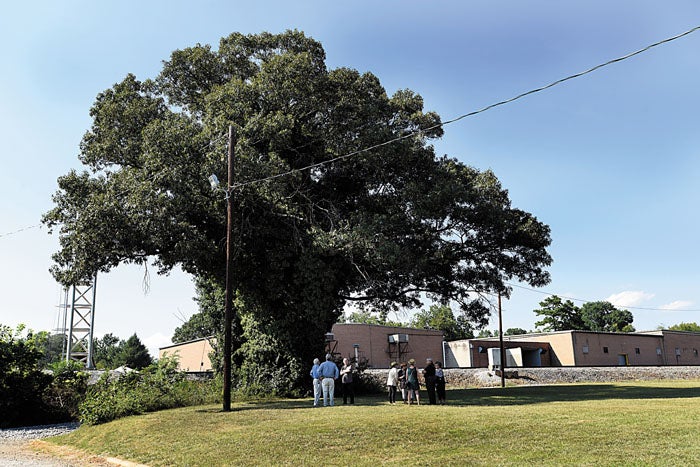My Turn, Susan Lee: Divisive? Indeed
Published 5:47 pm Wednesday, August 15, 2018

- The 2017 Service of Truth, Healing, and Reconciliation was held at North Long and Gillespie streets near the site of the lynchings in 1906. People speculated that this tree was the one on which the lynchings occured. Salisbury Post File Photo
On Aug. 7, a full 112 years after the 1906 lynchings, the Salisbury City Council considered a Resolution of Reconciliation brought forward by Mayor Al Heggins. A majority of its members impugned the document. They appeared to be caught off guard by its forthright nature, as if the candid address of these atrocities were itself an offense. Nevertheless, Salisbury is evolving. It was not necessary for an uncontrolled crowd to take matters into its own hands. It required only two Council members’ disapproval, along with a third’s vehement accusations, to hog tie — if not strangle — the resolution.
Describing the lynchings as “biased, bigoted, racist, violent and hateful” drew scrutiny, although acts of racial terror are, by definition, aptly represented by these descriptors. The resolution unflinchingly states the brutal indignities perpetrated on the bodies of the lynching victims. This firmly underscores its call for unequivocal denouncement of these acts and for deep community healing. Even so, these words were considered by at least one council member as unnecessarily “raw.” Granted, those words may have been better received if prepared differently. Perhaps if steamed to the point of evaporation so as to remain unspoken? Surely this would cater to the dominant culture’s delicate sensibilities, its genteel distaste for the unspeakable.
The council deliberated for the purposes of posterity and, it would appear, for the purpose of maintaining a preferred narrative. Perhaps the document could be softened, made more palatable, less uncomfortably honest? In a word, less “divisive”?
We must question: Of what is this resolution considered to be divisive — and by whom? Who benefits from antiseptic narratives that downplay injustices enacted upon some and bestow unearned privileges upon others? What is at stake when long-held narratives that overshadow long-buried events are examined?
Holding a dominant narrative up to the shattering light of alternative perspectives necessarily divides it, divesting it of its official, single story status. A narrative thus divided, cannot stand. And this is good. Chimamanda Ngozi Adichie, Nigerian author and winner of the 2018 PEN Pinter Prize, warns of the danger of a single story. She states:
“It is impossible to talk about the single story without talking about power. …
“Like our economic and political worlds, stories, too, are defined by the principle of nkali [to be greater than another]. How they are told, who tells them, when they’re told, how many stories are told, are really dependent on power. Power is the ability not just to tell the story …but to make it the definitive story.”
Facts can be established. Yet, there can never be single interpretation that results in one final story. That is, unless power intervenes. Councilman David Post leveled the word “divisive” against the resolution’s alternative perspective. Perhaps Mr. Post was merely imploring a less straightforward description of events. However, criticizing the document as divisive implies that a unified community somehow exists, despite significant and glaring gaps in health, wealth, opportunity and education that indicate otherwise. Underestimating the impact of these gaps creates division. Overlooking a community’s longstanding concern about them creates division.
Calls for restorative justice, intentionality, fairness, open-mindedness, peace, anti-racism and love resounded in the mayor’s resolution. They went unacknowledged by its detractors. The resolution’s unifying call for citizens to work together to eradicate violence and hatred also went unacknowledged, as did the expressed need for healing.
Concerns about current inequities redolent of past injustices were voiced. Public comments pointing out entrenched practices endemic of systemic racism were not enjoined. This, too, creates division.
But, is it divisive to commemorate past injustices and examine current inequities routinely visited upon the poor and upon people of color? Is it divisive to question the norms of mass incarceration, racial profiling, school-to-prison pipelines and to investigate abuses within law enforcement and the judicial system? If so, then I join with many like-minded citizens who acknowledge and accept the responsibility of being “divisive” in the name of progress toward a more just and equitable Salisbury.
Susan Lee is a resident of Salisbury.


